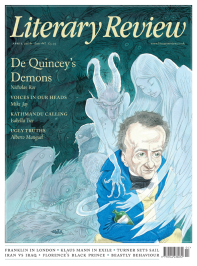Sarah Darwin
Four Legs Good
Being a Beast
By Charles Foster
Profile Books 218pp £14.99
Like a shaman, Charles Foster seeks to channel his revelations of animal-ness to us mere humans. His stories are both sublime and hilarious, often within a single sentence: he has you breathing in with awe and out with a guffaw. Yet reading Being a Beast is in part a serious business. Foster is intensely provocative and pushes the boundaries of nature writing. Just when you think he can go no further, he does just that and breaks another taboo.
A barrister, veterinarian, Oxford don, writer, wanderer and eccentric, Foster yearns to discover, viscerally, what it is like to be an animal. This is no whim or flight of fancy. Indeed, it seems that it has been his lifelong quest to peel back ‘the thin membrane that separates this world from others, and your species from other species’. He selects five beasts to represent the elements: the badger and red deer (living below and above ground respectively) stand for earth, the otter for water, the fox for fire and the swift for air. The intense and unique method of exploring these animals, their elements and landscapes leads to a lavish, entertaining and brilliant book.
The badger is first up. Digging down, with the help of Foster’s farmer friend Burt and his JCB, he creates a small but man-sized badger sett. Settling in for the summer, Foster and his young son Tom quickly adapt to a badger-like nocturnal lifestyle. By night they crawl around the woodland on all fours: ‘We bustled and grunted and elbowed and pushed and pressed our noses into the ground.’ Together they make scent maps of their surroundings, savouring the rich bouquet of the landscape after rain and comparing the aromas of the valley at the different times of day. Foster describes the perfumes of the woodland palette with the kind of verve, detail and command of metaphor that would turn a master of wine green with envy.
It is perhaps not surprising that otters represent the watery element in this book. As a child Foster purchased a stuffed otter, after having ‘mortgaged’ his Lego, and would stroke its scarred muzzle while falling asleep. Attributing this disfigurement to vicious hounds, he took upon himself the woes and guilt of humankind. ‘Otters made me wander,’ he writes – and indeed he does. He swims and floats in rivers by day and night. And he takes us along the river banks, showing us otter spraints – faeces that otters use as territorial markers. Confirming his deep commitment to his mission, or his deep eccentricity, or both, Foster then makes his children leave their own spraints along a river bank to mimic otter behaviour.
Foster suggests that otters have no time for ‘emotional fripperies’ or joyfulness, as in Henry Williamson’s Tarka the Otter: ‘To be a perpetual hunter, in an economy like ours and theirs, is to be perpetually hunted.’ Otters are territorially vicious, perhaps more so today, Foster laments, as pollution has diminished their natural prey. They are ‘jangling, snarling, roaming, twitching bundles of ADHD’. And realising that the wounds on his precious stuffed otter’s head were probably not caused by man or hound but by a territorial fight with another otter, Foster’s childhood impressions of the cute-looking creatures are crushed, as are mine.
We are then transported into an environment that is more familiar to city folk – that of the urban fox. Here Foster actually gets very close to his role models, even managing lingering eye contact with a vixen. He imitates a pair of foxes as they lick crane flies off dew-laden grass, likening it to ‘ticklish rice-paper garnish that turns to vanilla slime’. But humans come along to spoil his antics: a policeman, who finds him napping under a rhododendron bush, does not buy the being-a-fox story and tells him to ‘bugger off home, sir’.
I read sections of this book to my children. Their usual wriggling attentiveness was transformed into rigid respect for the antics of Foster and his beguiling family. Being a Beast is a gripping work of art, beautifully and inspiringly written. He successfully challenges both the anthropocentrism and anthropomorphism that pervade much nature writing. It is a must for anyone who wants new insights into the secret lives of some of our fellow creatures and into our own animal nature as well.

Sign Up to our newsletter
Receive free articles, highlights from the archive, news, details of prizes, and much more.@Lit_Review
Follow Literary Review on Twitter
Twitter Feed
It wasn’t until 1825 that Pepys’s diary became available for the first time. How it was eventually decrypted and published is a story of subterfuge and duplicity.
Kate Loveman tells the tale.
Kate Loveman - Publishing Pepys
Kate Loveman: Publishing Pepys
literaryreview.co.uk
Arthur Christopher Benson was a pillar of the Edwardian establishment. He was supremely well connected. As his newly published diaries reveal, he was also riotously indiscreet.
Piers Brendon compares Benson’s journals to others from the 20th century.
Piers Brendon - Land of Dopes & Tories
Piers Brendon: Land of Dopes & Tories - The Benson Diaries: Selections from the Diary of Arthur Christopher Benson by Eamon Duffy & Ronald Hyam (edd)
literaryreview.co.uk
Of the siblings Gwen and Augustus John, it is Augustus who has commanded most attention from collectors and connoisseurs.
Was he really the finer artist, asks Tanya Harrod, or is it time Gwen emerged from her brother’s shadow?
Tanya Harrod - Cut from the Same Canvas
Tanya Harrod: Cut from the Same Canvas - Artists, Siblings, Visionaries: The Lives and Loves of Gwen and Augustus John by Judith Mackrell
literaryreview.co.uk